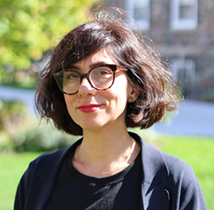News
» Go to news mainHow welcoming is Canada?

When the war in Ukraine started and Canada welcomed some Ukrainian refugees – Dr. Raluca Bejan became interested in the difference in their reception vs. the recent refugee wave from Afghanistan.
Dr. Bejan, School of Social Work, is an expert in migrant and refugee issues, and has recently released findings of a study looking at the inequalities of Canada’s reception of refugees from Ukraine versus Afghanistan.

She and her team looked at literature about the reception policies of both groups from May 2021 – May 2023 which includes Afghan and Ukrainian refugees, with the goal of theorizing and creating policy recommendations. The study is titled .
The researchers found there were differences in how each group was allowed into Canada, with none of the options being ideal.
The entry stream for Ukrainians had less restrictions, but it was conditional on class. Successful applicants needed more money than an average Ukrainian to come into this stream, and the minimum wage in Ukraine is $189 euros a month. Ukrainians coming into Canada through this stream are only given temporary citizenship and the only people who can transition to permanent residency are those who have family in Canada. So they may get in, but not be able to stay. Also Dr. Bejan explains the stream is closed, but the war isn’t over. She said she was surprised to find out that Canada took less than four percent of Ukrainian refugees.
The Afghan stream had very strict eligibility, but it did come with permanent residency. Most Afghans who were welcomed were able to show a former connection with Canada such as someone who assisted the country with former diplomatic efforts or was an interpreter, which Dr. Bejan says again is a measure of class. A very limited amount of people met these restrictions, and again we took less than four percent of Afghan refugees during the latest wave of refugees who were fleeing from the Taliban
“This is why we say both options are worse,” Dr. Bejan explains. “Those who are welcomed are normally of higher class and have some connection with the hosting country.”
Factors at play
Dr. Bejan says people tend to homogenize Canada’s response in terms of welcoming of refugees as being solely connected on race. Race is definitely a variable in the equation, but several other variables are also at play, such as nation’s political interests and foreign policy relations, as well as other identity-based components such as gender and class.
She explains that during the Cold War, Afghans were considered preferred refugees because they were fighting the Soviets, but this changed after 9/11. Now Ukrainians are the preferred refugees because they fight Russia, which is perceived as the number one enemy of the West.
The research also shows society tends to be more welcoming to women compared to men. There were more Ukrainian women traveling as refugees as most men were required to be enrolled in military duty, hence gender also matters in a state’s welcoming towards categories of refugees.
Next steps
Dr. Bejan hopes to prompt decision makers to delve into these migration policy decisions further. She and her team plan to investigate more variables such as nationality, race, gender and ethnicity, and are very interested to study the refugee process for Syrian refugees into Canada.
Temporary foreign workers in Nova Scotia
Dr. Bejan also released a new study that found temporary foreign workers in Nova Scotia experienced overcrowded housing, wage theft, discrimination and difficulty accessing health care despite regulations meant to address some of these issues.
Recent News
- Lighting the path: Courtney Pennell's mission to support and empower Indigenous nursing students
- Belief in leadership: New Kinesiology course offers lessons from Lasso
- Two Dal Health graduate students heading to the 3MT finals
- Breaking the cycle: Rethinking substance use, stigma, and social inequities in Canada
- Top 10 Dal Health stories of 2024
- Cards for care: Semester three nursing students collect $1,600 for MOSH
- Master of Health Administration grad continuing cancer research in PhD in Health program
- SWAB‑Rx study aims to expand sexual health services in pharmacies
